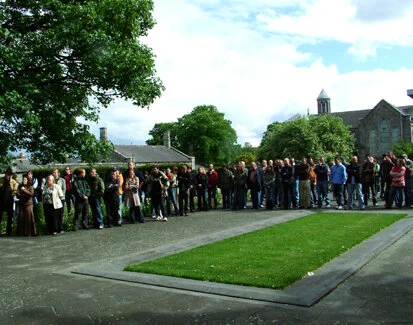First Annual Éirígí James Connolly Commemoration
Close on 100 people attended the first annual Éirígí James Connolly commemoration in Arbour Hill cemetery, Dublin yesterday.
The event, held on the 91st anniversary of the execution of the republican leader, also honoured fellow 1916 leader Sean MacDiaramada, who was executed by a British firing squad on the same day as Connolly. Éirígí spokesperson Daithí Mac An Mháistír also reminded those present that the date marked 26 years since the death on hunger strike of freedom fighter Francis Hughes.
The commemoration was addressed by veteran socialist and republican activist Bernadette McAliskey. McAliskey praised Éirígí stating that ‘It was a deliberate decision of my own to come and speak at the event here today. I’d like to take the opportunity to congratulate Éirígí who have steadfastly and quietly and with considerable maturity to have built their organisation to the point were it is today. And to have taken on, once again, that personal responsibility, that comes, in the words of Fintan Lalor of being the somebody, who somewhere, and some how decides again to make a new beginning’.
Éirígí spokesperson Daithí Mac An Mháistír addressing the crowd stated ‘When Éirígí was initially founded we were very conscious of the enormity of the decision we had taken and of the work we had to do. We were very conscious of the very weak condition which the Socialist Republican constituency in Ireland found itself in at the beginning of the 21st century. We had come to a point of acknowledging that the potential that had existed for the realisation of a deep and broad current for revolutionary change had been subverted and corralled into the reactionary space of Constitutional Nationalism, if however temporarily’.
Daithi continued ‘We find ourselves in this cul-de-sac today primarily because the Republican struggle as a phenomenon at large has at no time actually attempted in any concerted way to develop a revolutionary socialist understanding of the economic & political changes required in Ireland, nor has it defined the nature of the socialism it often proclaims would reign within a future Republic. The failure to make this demand a real & central element of the Republican programme has in great part been the reason why the struggle for national independence itself has failed. This is, ultimately, because working people have no real and abiding affinity with a Nationalism that is concerned only with borders and the control of territory. One can neither eat a flag nor live in it. It is the social relations extant in a community, society or nation that are of real importance. Resistance to British rule must in essence be about the rejection of a philosophy that would hold the interests of one class as being superior to those of another. What we must resolve to do then at this juncture is rescue the Republican struggle from the Nationalist & reformist cul-de-sac within which it finds itself.’

